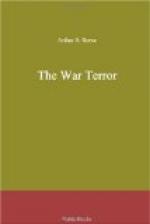It was an intensely bitter taste and very persistent, for even after we had rinsed out our mouths it seemed to remain, clinging persistently to the tongue.
He placed some of the grains in some pure water. They dissolved only slightly, if at all. But in a tube in which he mixed a little ether and chloroform they dissolved fairly readily.
Next, without a word, he poured just a drop of strong sulphuric acid on the crystals. There was not a change in them.
Quickly he reached up into the rack and took down a bottle labeled “Potassium Bichromate.”
“Let us see what an oxidizing agent will do,” he remarked.
As he gently added the bichromate, there came a most marvelous, kaleidoscopic change. From being almost colorless, the crystals turned instantly to a deep blue, then rapidly to purple, lilac, red, and then the red slowly faded away and they became colorless again.
“What is it?” I asked, fascinated. “Lead?”
“N-no,” he replied, the lines of his forehead deepening. “No. This is sulphate of strychnine.”
“Sulphate of strychnine?” I repeated in astonishment.
“Yes,” he reiterated slowly. “I might have suspected that from the convulsions, particularly when Josephson said that the noise and excitement of the arrival of the ambulance brought on the fatal paroxysm. That is symptomatic. But I didn’t fully realize it until I got up here and tasted the stuff. Then I suspected, for that taste is characteristic. Even one part diluted seventy thousand times gives that decided bitter taste.”
“That’s all very well,” I remarked, recalling the intense bitterness yet on my tongue. “But how do you suppose it was possible for anyone to administer it? It seems to me that he would have said something, if he had swallowed even the minutest part of it. He must have known it. Yet apparently he didn’t. At least he said nothing about it—or else Josephson is concealing something.”
“Did he swallow it—necessarily?” queried Kennedy, in a tone calculated to show me that the chemical world, at least, was full of a number of things, and there was much to learn.
“Well, I suppose if it had been given hypodermically, it would have a more violent effect,” I persisted, trying to figure out a way that the poison might have been given.
“Even more unlikely,” objected Craig, with a delight at discovering a new mystery that to me seemed almost fiendish. “No, he would certainly have felt a needle, have cried out and said something about it, if anyone had tried that. This poisoned needle business isn’t as easy as some people seem to think nowadays.”
“Then he might have absorbed it from the water,” I insisted, recalling a recent case of Kennedy’s and adding, “by osmosis.”
“You saw how difficult it was to dissolve in water,” Craig rejected quietly.
“Well, then,” I concluded in desperation. “How could it have been introduced?”




